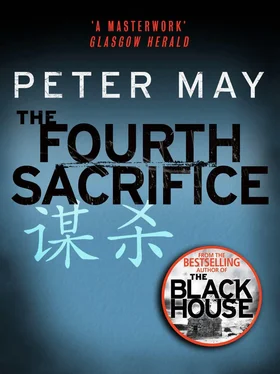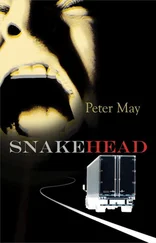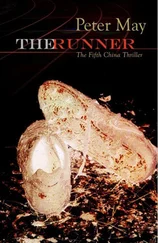Peter May - The Fourth Sacrifice
Здесь есть возможность читать онлайн «Peter May - The Fourth Sacrifice» весь текст электронной книги совершенно бесплатно (целиком полную версию без сокращений). В некоторых случаях можно слушать аудио, скачать через торрент в формате fb2 и присутствует краткое содержание. Год выпуска: 2012, Издательство: Quercus, Жанр: Триллер, на английском языке. Описание произведения, (предисловие) а так же отзывы посетителей доступны на портале библиотеки ЛибКат.
- Название:The Fourth Sacrifice
- Автор:
- Издательство:Quercus
- Жанр:
- Год:2012
- ISBN:нет данных
- Рейтинг книги:4 / 5. Голосов: 1
-
Избранное:Добавить в избранное
- Отзывы:
-
Ваша оценка:
- 80
- 1
- 2
- 3
- 4
- 5
The Fourth Sacrifice: краткое содержание, описание и аннотация
Предлагаем к чтению аннотацию, описание, краткое содержание или предисловие (зависит от того, что написал сам автор книги «The Fourth Sacrifice»). Если вы не нашли необходимую информацию о книге — напишите в комментариях, мы постараемся отыскать её.
The Fourth Sacrifice — читать онлайн бесплатно полную книгу (весь текст) целиком
Ниже представлен текст книги, разбитый по страницам. Система сохранения места последней прочитанной страницы, позволяет с удобством читать онлайн бесплатно книгу «The Fourth Sacrifice», без необходимости каждый раз заново искать на чём Вы остановились. Поставьте закладку, и сможете в любой момент перейти на страницу, на которой закончили чтение.
Интервал:
Закладка:
*
No. 29 Middle School was hidden away behind a plain white-tile entrance at the far corner of a bus park just off Qian Men Xi Da Jie, a spit away from the south-west corner of Tiananmen Square. Above the heavy green metal gates, a photograph mounted on a long board showed the school’s original elaborate stone entrance. Zhao parked the Jeep outside, and a janitor hurried out from a brick gatehouse to let them in. As the metal gates swung closed behind them, they entered a strange oasis of calm in the centre of the city. Two-storey, brick-built classroom blocks stretched off to left and right, shaded by neatly cropped trees. Through a tunnel lined with school noticeboards and potted plants with luxuriant leafy fronds, the sun shone directly on to a tree-lined quadrangle with basketball and badminton courts. Classrooms overlooked it from all sides. The sounds of traffic in the street had become a distant rumble.
Li looked around in amazement. ‘I had no idea this place was here,’ he said.
‘It used to be a university,’ the janitor said.
Zhao frowned. ‘What do you mean?’
‘University of China.’ The janitor grinned and nodded. Li thought, perhaps he was a little simple. ‘Sun Yat-Sen founded the university in 1912. We have an exhibition. Come and see.’
And he ushered them into a classroom that had been converted into an exhibition room. Blue panels mounted all around the walls exhibited photographs of the school’s founders and teachers, and other historic memorabilia. The janitor was not simple. It had been founded by the President of the first Chinese Republic, Sun Yat-Sen, and it had indeed been the University of China. Faces from history stared down at them from the walls: the balding Sun Yat-Sen with his neatly clipped silver moustache; the crop-haired Li Da Zhao with his Stalinesque whiskers, a professor of economics there in the twenties who had translated the works of Marx into Chinese for the first time, before being hanged by Chiang Kai-Shek in 1928; the honorary headmaster, General Zhang Xüe Liang, who betrayed Chiang Kai-Shek to the communists in the infamous Xi’an incident of 1936. In a glass case stood the bell that had called the first students to class at the start of the previous century. And it had hung from a tree that today still stood sentinel over the quadrangle outside.
The story of the school’s history written on the walls revealed that when the communists came to power in 1949, the University of China had become ‘The New Beginning Middle School’, then three years later, more prosaically, the No. 29 Middle School.
A young man wearing jeans and a dark zip-neck sweatshirt over a grey tee shirt, hurried into the room, a little short of breath. ‘How do you do?’ he said, shaking their hands. ‘The headmaster asked me to take care of you this morning. I have no classes till the afternoon.’
‘You are a teacher?’ Li asked, surprised. Teachers had not dressed like that in his day.
‘Sure,’ said the teacher. ‘I am Teacher Huang.’
‘There’s quite a history to this place,’ said Li.
‘Sure. We are very proud of our history,’ Teacher Huang said. ‘But now we are just a Middle School. We have six hundred students and one hundred and fifty teachers. Follow me. You can have my classroom for the interviews.’
Teacher Huang’s classroom had four rows of six desks, with a long blackboard at either end. Tall windows opened out on each side of the room. Li lifted a chair down from a desktop. ‘Are there no classes this morning?’
‘Sure,’ said Teacher Huang. ‘There are plenty of classes. You will know when they have a break, because the students will make plenty of noise.’ He grinned. Then, ‘An old teacher from here, Lao Sun Lian, and some former pupils are waiting in another room. When you want to speak to them let me know.’
‘Send in Teacher Sun,’ Li said. And then as Teacher Huang went to the door, asked, ‘By the way, what happened to the original school gate?’
‘It was destroyed by Red Guards during the Cultural Revolution,’ Teacher Huang said.
‘The same ones who destroyed the school records?’
Teacher Huang shrugged. ‘I don’t know. Possibly. But I am only twenty-eight. I don’t remember.’ And he went out.
Li and Zhao arranged three desks with two chairs for themselves on one side, and a single chair on the other. The smell of the classroom, of stale food and chalk dust, reminded Li of his own schooldays. It had the same pale green and cream walls, the same sense of something institutionalised, uniform and dull. Nothing, it seemed, had changed much over the years.
It was hot in here. Li wandered to the nearest window and opened it as wide as it would go. He looked out on the quadrangle. They had all played here, all four victims. They had shared the same experiences, suffered the same doubts and ignominies, the same hopes and aspirations. Something in this place, in its classrooms, or its quadrangle, something that had happened here more than thirty years before, had sown the seeds of destruction that someone with a bronze sword had harvested all these years later. Somewhere, here, in this cradle of modern Chinese academic history, lay a motive for murder. Li was sure of it.
Teacher Sun was seventy-nine years old, with thin, iron-grey hair scraped back across a scalp spattered brown with age spots. He wore an old blue cotton Mao suit. Not because it signified anything political, he told them, but because he had got used to wearing them, and they were cool and comfortable. It did not look as if there was much flesh on the bones beneath the baggy blue cotton. He walked with a stick and was dragging on the stump of a hand-rolled cigarette. He sat down on the other side of the desks and looked at them reflectively, a light shining still in his dark old eyes.
‘This makes me think,’ he said, ‘of the bad old days.’ And he stamped his cigarette end on the floor.
‘What days were those?’ Li asked.
‘When they brought me into classrooms like this and sat me down and talked rubbish at me for hours. And then wanted me to talk rubbish back.’
‘During the Cultural Revolution?’ Li said. The old man nodded. ‘You had a bad time?’
He nodded again. ‘Not as bad as some. But bad enough. Struggle Sessions, they called them.’ He chuckled. ‘They would struggle to make me confess and I would struggle not to.’
‘What did you have to confess to?’ asked Zhao.
‘Whatever it was they decided to accuse me of. If I didn’t confess I was accused of being arrogant and an active counter-revolutionary. If I did confess I was pilloried and abused. It was like those women accused of being witches in medieval Europe. They threw them into the river, if they survived they were witches, if they drowned they were innocent. There was no way you could win.’
‘But why would they want to accuse their teachers?’ Zhao was curious. Li glanced at him, surprised, then realised that the Cultural Revolution would have been over by the time Zhao started school, and it had been a long time after that before people spoke about what had happened. And now there was a whole generation profoundly ignorant about the events of those twelve tragic years.
But the old man just smiled sadly at Zhao’s ignorance. ‘Had you been here, you could have read why,’ he said. ‘The Red Guards came and pasted da-zi-bao posters all over the walls out there in the square, great handwritten propaganda posters denouncing us all as revisionists.’ He chuckled and shook his head. ‘Of course, usually it was the stupid ones who led all the attacks, and they just copied their slogans from the newspapers. Apparently, although we did not hold bombs or knives, we teachers were still dangerous enemies. We filled our students with revisionist ideas. We taught them that scholars were superior to workers, and promoted personal ambition by encouraging competition for the highest grades. It seems the authorities believed that in trying to raise the standards and expectations of our students we were changing good young socialists into corrupt revisionists. In truth, it was simply that an ignorant peasant was less of a threat than an intelligent thinker. So the leaders believed that the invisible knives wielded by the teachers were much more dangerous than any real knives or guns.’
Читать дальшеИнтервал:
Закладка:
Похожие книги на «The Fourth Sacrifice»
Представляем Вашему вниманию похожие книги на «The Fourth Sacrifice» списком для выбора. Мы отобрали схожую по названию и смыслу литературу в надежде предоставить читателям больше вариантов отыскать новые, интересные, ещё непрочитанные произведения.
Обсуждение, отзывы о книге «The Fourth Sacrifice» и просто собственные мнения читателей. Оставьте ваши комментарии, напишите, что Вы думаете о произведении, его смысле или главных героях. Укажите что конкретно понравилось, а что нет, и почему Вы так считаете.












